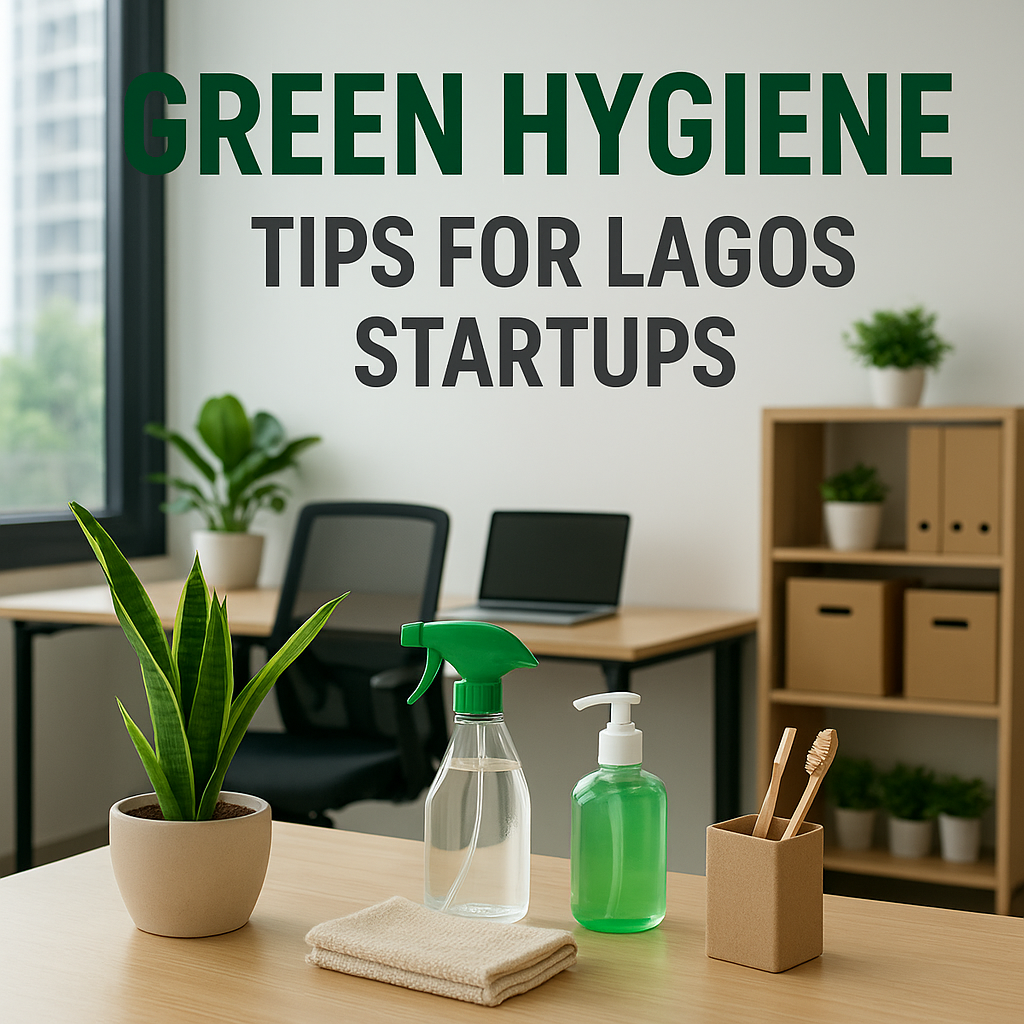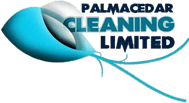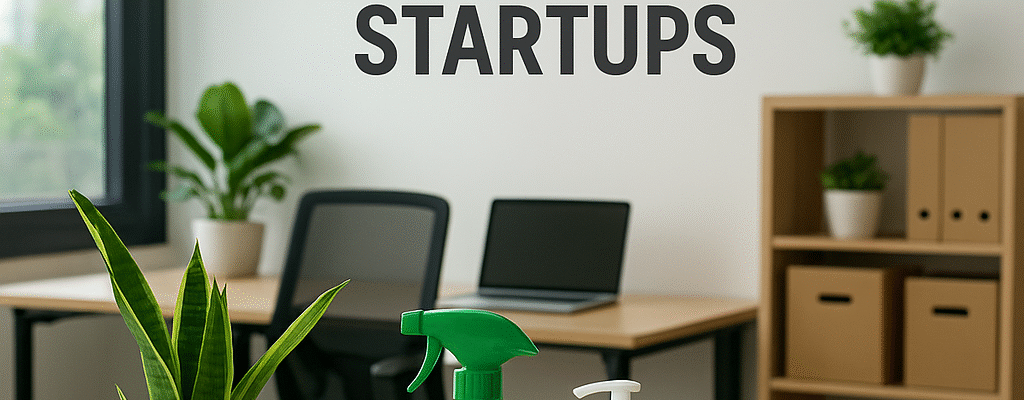In the vibrant heart of Lagos, where innovation fuels Nigeria’s economic growth, maintaining a clean, healthy, and eco-friendly workspace is more than just a routine — it’s a business strategy. As the city continues to boom with startups in fintech, agritech, and e-commerce, the challenges of urban living—humidity, pollution, and clutter—often take a toll on workplace productivity. Adopting Green Hygiene Tips for Lagos Startups is therefore a game-changer, helping entrepreneurs create environments that inspire focus, foster well-being, and align with sustainability goals.

Table of Contents
The Importance of Green Hygiene in Lagos Startups
Green Hygiene Tips for Lagos Startups emphasize more than just cleanliness; they prioritize sustainability, health, and resource efficiency. Lagos’ tropical climate, with humidity levels soaring as high as 90% and frequent dust from harmattan winds, can quickly turn offices into breeding grounds for mold and allergens. Poor hygiene in such conditions not only risks the health of your team but also stifles creativity and efficiency.
A clutter-free, well-maintained environment directly influences focus and innovation. Studies reveal that organized spaces reduce stress and absenteeism, while eco-friendly hygiene methods improve air quality and employee morale. For startups operating on limited budgets, these sustainable methods lower long-term costs, enhance brand credibility, and support Nigeria’s environmental objectives.
Beyond internal benefits, Green Hygiene Tips for Lagos Startups help businesses stand out. Investors and clients increasingly favor companies with visible commitments to sustainability. Aligning with the UN Sustainable Development Goals and local eco-friendly policies can also unlock funding opportunities and partnerships. In a competitive city like Lagos, where reputation matters, a clean, green workspace reflects professionalism and responsibility.
Choosing Eco-Friendly Sanitation Products
Implementing Green Hygiene Tips for Lagos Startups begins with smart product selection. Eco-conscious cleaning doesn’t mean expensive imports—Lagos offers plenty of local options. Choose biodegradable disinfectants, plant-based soaps, and reusable cleaning tools that minimize waste while maintaining hygiene standards.
For startups battling humidity and odors, consider air fresheners and deodorizers from local Industries, which use natural perfumes and non-toxic ingredients to purify indoor air. These options embody the core of Green Hygiene Tips for Lagos Startups—protecting both people and the planet without compromising on cleanliness.
Waste Reduction as a Core Green Strategy
Waste management is one of the most impactful Green Hygiene Tips for Lagos Startups. In a megacity where waste disposal remains a pressing challenge, startups can take small but powerful steps to minimize their environmental footprint.
Begin with the classic mantra: reduce, reuse, recycle. Move toward paperless operations by digitizing documents and communications—an easy step that can cut waste by half. Establish clear recycling points within your office and partner with recycling companies to manage plastics and e-waste responsibly.
Consider composting food waste, especially in offices where meals are common. Lagos startups can collaborate with local waste management startups, which digitizes and rewards recycling efforts. These actions demonstrate that Green Hygiene Tips for Lagos Startups are not only practical but can also drive social impact through community engagement.
Clean Workspaces, Clear Minds: The Productivity Link
A clean workspace is a productive workspace. Numerous studies link cleanliness to better focus, higher creativity, and improved morale. Implementing Green Hygiene Tips for Lagos Startups ensures that your employees work in an environment conducive to innovation.
An orderly, hygienic space communicates care from leadership, which boosts loyalty and reduces turnover. In a fast-paced startup ecosystem like Lagos, this translates to fewer sick days, stronger collaboration, and sustained productivity. Cleaner air and natural scents also reduce fatigue and anxiety, giving your team the mental clarity needed to excel.
Practical Green Hygiene Habits for Everyday Use
Adopting Green Hygiene Tips for Lagos Startups doesn’t have to be complicated. Here are some practical steps for busy founders:
- Daily Cleaning Routine: Wipe desks and shared spaces twice daily using natural sprays with citrus or lemongrass extracts.
- Combat Humidity: Use affordable dehumidifiers and air-purifying plants like snake plants or peace lilies to maintain air freshness.
- Educate Staff: Conduct monthly workshops on sustainability and hygiene practices.
- Source Locally: Support Nigerian eco-brands that provide biodegradable or refillable cleaning supplies.
- Monitor Progress: Use simple checklists or sustainability audits to ensure continued adherence.
- Outsource When Needed: Partner with professional eco-cleaning firms such as Palmacedar Cleaning Services, known for their environmentally responsible methods.
These small, consistent actions are the backbone of effective Green Hygiene Tips for Lagos Startups, keeping operations clean and sustainable.
The Broader Impact of Green Hygiene on Lagos’ Future
By embracing Green Hygiene Tips for Lagos Startups, entrepreneurs contribute to Lagos’ broader environmental transformation. Each startup that adopts sustainable hygiene practices helps reduce waste, curb pollution, and improve public health outcomes. Collectively, these efforts can redefine the city’s business landscape, positioning Lagos as a model for green enterprise in Africa.
Moreover, as global investors and partners increasingly prioritize ESG (Environmental, Social, and Governance) standards, startups that champion sustainability through hygiene gain a competitive edge. Clean, eco-conscious workspaces reflect not just aesthetic excellence but ethical leadership.
A Clean Step Toward a Sustainable Tomorrow
The journey toward sustainability begins right within your workspace — in the choices you make, the air you breathe, and the habits you cultivate daily. Green Hygiene Tips for Lagos Startups offer more than just cleaning advice; they represent a conscious shift toward creating work environments that inspire creativity, responsibility, and long-term growth. In a city as dynamic and demanding as Lagos, where startups power innovation and opportunity, embracing eco-conscious hygiene practices is essential to staying competitive while protecting both people and the planet.
By integrating eco-friendly cleaning products, responsible waste management systems, and consistent sustainable habits, startups can transform their offices into healthier and more productive spaces. These small steps — using biodegradable materials, reducing plastic use, and ensuring clean indoor air — make a powerful difference. A clean environment nurtures mental clarity, teamwork, and morale, all of which are vital for the success of any growing enterprise.
Every wipe of a desk, every recycled paper, and every fresh breath of air contributes to something bigger: a collective movement toward environmental consciousness. Green Hygiene Tips for Lagos Startups remind us that sustainability is not a one-time project but a lifestyle that adds value to your brand, your people, and your city. It promotes a culture where every team member becomes a steward of the environment, turning everyday routines into acts of positive change.
Ultimately, embracing Green Hygiene Tips for Lagos Startups is more than keeping your workspace spotless — it’s a declaration of intent. It signals that your startup stands for progress, innovation, and care for the ecosystem that sustains all business growth. A clean, green workspace is not just a reflection of your professionalism; it’s an investment in a cleaner, smarter, and more sustainable Lagos for generations to come.









































